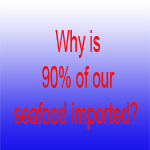|
Background on
the "Give Swordfish A Break" campaign
In recent months the U.S. fishermen that harvest
the broadbill swordfish have become the targets of the well-funded Give
Swordfish A Break campaign. Many swordfish - and several other open-ocean
fish known collectively as highly migratory species - are harvested in
offshore waters beyond the 200 mile management zones of coastal nations.
As a consequence they are usually managed by international bodies. In the
case of swordfish, the management authority is the International Convention
for the Conservation of Atlantic Tunas (ICCAT). ICCAT is an international
organization established via treaties signed by all the member nations,
including the U.S. The organizations behind the Give Swordfish A Break
campaign don't agree with the way ICCAT is managing the swordfish fishery.
Not able or willing to work for change within a well-established, science-based
mangement system, they are trying to force change by organizing a U.S.
consumer boycott.
Unfortunately this boycott, while having little
or no effect on the nations or fishermen who are not complying with existing
regulations, will greatly impact the U.S. swordfish fleet and the coastal
communities that serve as their home ports. And the U.S. swordfish fleet,
which is made up of under 200 boats generally operated as family businesses,
is in full compliance with all of the appropriate federal and international
regulations.
The links below will take you to a series of articles
that examine the swordfish issue.

|
An article from the Dallas Observer which dissects
the swordfish boycott and puts it in a much more realistic perspective. |

|
An article from the St. Petersburg (Florida)
Times which addresses SeaWeb's motivations for "saving swordfish" and points
out some of the hypocrisy this boycott is laced with. |

|
A NJ FishNet that looks at the swordfish boycott
and provides some background information on the organizations that are
supporting it. |

|
A profile of Linda Greenlaw, a swordfish longline
fleet high liner and one of the people featured in Sebastian Junger's best
selling book The Perfect Storm. |

|
A review of The Perfect Storm,
a book detailing the last days of the ill-fated swordfish longliner
Andrea
Gail and her crew. |
 |
An article from the Philadelphia Inquirer describing
a debate between the supporters of the Pew/SeaWeb consumer boycott and
a chef who took the trouble to determine what the actual situation was
regartding U.S. fishermen. |
 |
A follow-up column from the Philadelphia Inquirer
describing Chef Jack McDavid's position in taking on the Pew Trust financed
swordfish boycott. |
 |
What you will be missing - Part I: Marinated
Swordfish Acapulco Style from The Nouvelle Cuisine Cookbook
by Armand Aulicino. |
 |
What you will be missing - Part II: UskuKilic
Sis (skewered swordfish) from Turkish Cookery by
Inci Kut. |
 |
What you will be missing - Part III: Charcoal
- Broiled Swordfish from The Martha's Vineyard Cookbook
by Louise Tate King and Jean Stewart Wexlar. |
 |
From the article on a JAMA study: "Sea bass?
Flounder? Eat up. There's evidence, scientists said Tuesday, that ocean
fish pose little risk, even to children and pregnant women, from low levels
of mercury they pick up in the aquatic food chain." |
 |
An article from the Boston Globe food section
on the swordfish boycott that covers both sides in what is becoming an
increasingly controversial Pew backed initiative. |
|



